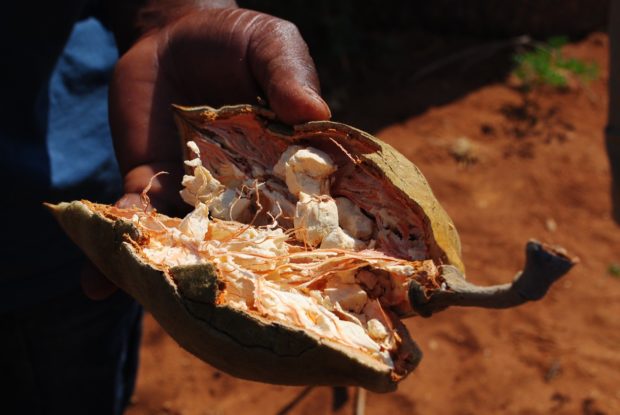While pumpkin is often seen as a superfood when it comes to the colder months, the antioxidant powerhouse of the baobab fruit may soon take its place. The fruit is grown on the Baobab tree, which is native to Africa, Australia, and the Middle East. Known as the tree of life, the Baobab is an incredibly old tree. The oldest tree has been traced back 6,000 years (1). Unfortunately, over the years, nine of the 13 largest and oldest African baobab specimens have suddenly collapsed or died – likely due to climate change.
Tree of Life
Known as the tree of life, every part of the Baobab tree has been used for both food and medicine. For instance, the fruit is edible with a citrus flavor, as are the leaves. Also, the seeds have been ground into powder form. As all of these foods are incredibly rich in several essential nutrients, they are a staple food in many diets. Each edible part of the tree contains a healthy amount of vitamin C, potassium, carbohydrates, potassium, magnesium, iron, zinc, fiber, and calcium, as well as B vitamins.
So, whilst pumpkins may always be on your fall food list, let’s look at all the benefits that can come by swapping out your favorite spiced latte with something that has baobab.
Baobab Health benefits
Balance Blood Sugar Levels
Keeping your blood sugar balanced and regulated is important as this keeps you healthy and energized. Yet any disruption can cause sugar cravings, changes in mood, and it can even increase the risk of diabetes. Thankfully, adding baobab to your diet can help keep your blog sugar balanced this fall.
For one, baobab contains high levels of fiber. This then slows down the absorption of sugar into the bloodstream, preventing any spikes in blood sugar.
Secondly, research published in the Nutrition Research journal found that adding baobab to white bread helped to control blood sugar levels.
Boosts Immune System
As mentioned, the baobab fruit is incredibly high in vitamin C (it contains seven to 10 times more than the amount found in oranges), which then makes it the perfect food to boost your immune system, alleviating symptoms and improving the outcomes associated with various diseases (2).
Additionally, a study published in the journal Food and Nutrition Sciences found that the fruit also contains anti-cancer properties.
Fights Inflammation
Chronic inflammation is often at the root of a number of health disorders. These include cancer, cardiovascular diseases, and autoimmune illnesses. With that said, maintaining your health also involves reducing the amount of inflammation in your body.

While there is still a need for more human studies, various animal studies have found that baobab fruit pulp and the extract have managed to reduce levels of inflammation in rodents (3, 4).
Aside from baobab, there exist other anti-inflammatory foods that you can add to your diet. Follow this link for more on those foods.
Help with weight management
If you’re looking to stay on top of your weight this fall, then you may want to look at baobab.
As mentioned, baobab is incredibly rich in fiber. This serves to promote feelings of satiety, keeping you fuller for longer. In fact, a study published in the journal Nutrition Reviews found that increasing one’s fiber intake by 14 grams served not only to reduce calorie intake but also led to a 4.2-pound loss of body weight over a four-month period.
In terms of baobab, a separate study involving 20 participants and published in the journal Nutrition and Health also noticed reduced feelings of hunger. The researchers had participants either consume a test smoothie containing 15 grams of baobab extract or a smoothie with zero baobabs. Following this, their subjective ratings of satiety were taken and the results revealed that the consumers of the baobab smoothie had significantly reduced feelings of hunger compared to the placebo drinkers.
Helps Iron Absorption
According to the World Health Organization, iron deficiency is the most common and widely spread nutritional disorder in the world. With that said, if you’re struggling with an iron deficiency, it may be advisable to increase your intake of baobab.
As mentioned, the baobab fruit is high in vitamin C. For those who are unaware, vitamin C can help your body absorb more iron. This is because the type of iron found in plant-based food (nonheme) is not easily absorbed by the body. However, combining it with the consumption of vitamin C can ensure that the body maintains its iron intake.
Promotes Digestive Health
Baobab is a good source of both soluble and insoluble fiber. This then makes it beneficial for both your digestive and gut health, as fiber can also benefit your gut microbiome.
The soluble fiber found in baobab helps to ease digestion by dissolving in the water found in your digestive system. Additionally, the soluble fiber found in the food also contains prebiotic properties. This then means that it promotes the growth of healthy bacteria in the gut. In fact, a study published in the Nature Communications journal found that the diet of the Hadza Tribe in Tanzania, who are believed to have the world’s healthiest guts (their gut microbiomes are 40% more diverse than the average Westerner), contains the baobab fruit as one of their staple foods.
In regards to insoluble fiber, this type of fiber doesn’t dissolve but rather acts as a laxative. It passes through the gut and encourages the passage of other foods. This then helps to alleviate constipation and other digestive disorders.
 Promotes Skin Health
Promotes Skin Health
Baobab is also rich in antioxidants and this makes it perfect for skin health.
For one, vitamin C not only helps to fight off free radicals that can cause premature aging, but it also serves to encourage the production of collagen as well as the regeneration of vitamin E – which not only serves to also enhance skin health, but it’s also found in the seeds.
How can I enjoy baobab this fall?
- The leaves can be added to salads.
- The fruit pulp can be dissolved in water or milk to be enjoyed as a drink.
- The dissolved fruit pulp can also be used as a sauce.
Additionally, while it may be hard to find fresh baobab fruit, it’s best to opt for the powder that’s available in powder or capsule form at your nearest health store, or you can even get it online. Once done, you can try out an African Baobab Smoothie recipe that will give you a great nutritional boost. Click here for more on the recipe.



 Promotes Skin Health
Promotes Skin Health![women [longevity live]](https://longevitylive.com/wp-content/uploads/2020/01/photo-of-women-walking-down-the-street-1116984-100x100.jpg)










